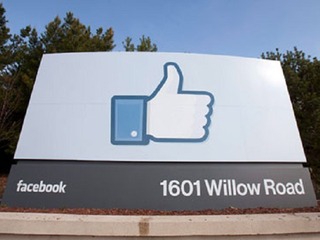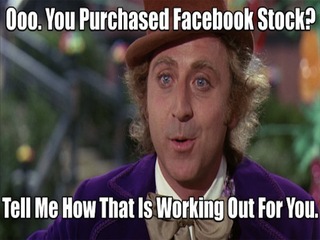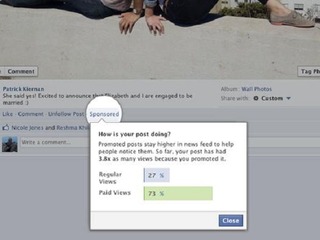Digital health funding declines for the third year in a row
AI-enabled digital health startups raised $3.7B, 37% of total funding for the sector
Read more...
(Updated to reflect change in Q3 estimates)
Shares of Facebook rose modestly in Monday trading as shareholders prefer to stay on the sidelines ahead of the company's third-quarter earnings report, to be released after the close Tuesday.
The stock could unravel, should Facebook post results that aren't up to snuff. But at least one analyst expects Facebook to release results that aren't so stellar. Doug Anmuth, an analyst at JP Morgan, released an earnings preview, in which he estimated that Facebook would earn 12 cents a share on revenue of $1.248 billion. This is in line with estimates of 11 cents a share on revenue of $1.23 billion.
Ahead of the report, Facebook shares rose nearly 2% to $19.32 in Monday trading. Shares have been slowly drifting lower this last quarter ever since Facebook posted in-line second-quarter results that sent shares tumbling. Given the stock's poor performance, an in-line quarter may be enough to pop it up a bit this time around.
To get ready for tomorrow's release, Anmuth laid out the key areas that shareholders should be looking at.
Ad revenue
In its second-quarter results, Facebook’s advertising grew 28% year-over-year to $992 million. In total, advertising revenue accounted for 84% of Facebook's total sales.
Facebook needs to reassure brand advertisers that it is worth advertising on the website, as growth estimates for the company's advertising properties are dropping. According to a revised forecast from market researcher eMarketer in August, Facebook will barely break $5 billion in total revenue for the year.
The $5 billionn estimate is down $1 billion from the research firm’s estimate from last February and the firm stated that the estimate cut in revenue reflected growing concerns about the effectiveness and measurability of Facebook ads.
Anmuth believes that Facebook’s ad revenue can re-accelerate, “as the first full quarter of Sponsored Stories (SS) on both Mobile and the Web—and early benefits from the Facebook AdExchange (FBX)—should help offset decelerating Marketplace growth due to the shift toward mobile.”
As a result, Anmuth is projecting ad revenue of $1.059 billion for the quarter, up 33% year-to-year, and 7% quarter to quarter. While this type of growth will be a gain over the second quarter, Facebook still will not back up to the 45% growth Facebook it saw year to year in the first quarter of 2012.
Mobile
Perhaps most important of all to Facebook's future prospects is advertising on mobile, as users increasingly flock there.
Facebook recently announced that it had reached over one billion worldwide users, and 60%, or 600 million, are also mobile users. But earlier this year, when the company reported second-quarter results, it also revealed that 20% of Facebook users were accessing Facebook only via mobile.
Clearly mobile is the growth opportunity as desktop user growth slows.
Desktop user growth gained 10% in the third quarter, down from 15% in the second quarter, according to comScore. Additionally, the minutes spent on Facebook’s desktop version was 14% growth in the quarter, down from 28% in the previous quarter.
Anmuth believes that daily active users are a better indicator of the shift toward mobile, as he notes that mobile users are now spending more time per person on Facebook than desktop users and are twice as likely to use Facebook. In the second quarter, Facebook said that it had 552 million DAUs on average an increase of 32% year-over-year. Anmuth did not indicate how many DAUs he expected Facebook to have in the upcoming quarter.
A key question, Anmuth says, is how Web marketplace ad revenue will fare in Facebook’s transition to mobile, “as the desktop has historically generated all of Facebook’s ad revenue and impressions likely decline in the transition to mobile.”
In his interview at TC Distrupt in September, CEO Mark Zuckerberg noted that people who use Facebook on mobile are more engaged, so he he expects Facebook is going to make a lot more money from mobile going forward.
In terms of advertising, Zuckerberg said, mobile is a lot closer to television than desktop is, just in terms of how the ads must be integrated, since, on desktops, Facebook has the ads that appear on the right hand column. On mobile, though, Facebook can’t structure its ads the same way, simply because there isn’t room on the screen, so the ads have to be more integrated. To that end, Facebook introduced a new mobile ads for apps, which allowed app developers to advertise on News Feeds on Facebook’s mobile app.
The ads appear in user News Feeds as what looks like suggestions, or recommendations, for which apps a user may like. For example, it may come under the header "try these games." Once a user clicks on one of the ads, or suggested apps, they will be redirected to either the iOS App Store or to Google Play to purchase that app.
Zuckberg said that these ads are already performing better than their desktop counterparts.
Also, Facebook has began testing out a new offline new off-site mobile ad network that targets ads toward people who use Facebook to authenticate a website.
Authentication gives the app the ability to know the identity of a Facebook user, and to read and write data via Facebook's APIs. The app will then use the Facebook data it has access to, including their sex, age, location and Likes, to target advertisements.
Facebook did not include how much of its revenue comes from mobile in its previously quartrly report, and these moves will likely not have much of an impact on the quarterly numbers due out tomorrow. What Facebook is hoping, though, is that investors are reassured that Facebook will be able to make money going forward.
Sponsored stories
Sponsored Stories are expected to take in $123 million for the quarter, of which $84 million will come from mobile and only $39 million from Facebook’s web version. That amounts to $1.35 million a day.
Anmuth notes that “these estimates are conservative, particularly in Mobile based on greater engagement per user and increased frequency of ads displayed by Facebook,” and that revenue from sponsored stories could be as high as $2 to $3 million a day.
“We remain bullish on Facebook’s mobile advertising opportunity and continue to believe the company’s mobile ad revenue could be more than $200M this year and more than $900M next year.”
According to the report, investors are worried that the growth of Sponsored Stories, it could mean that that marketers are simply moving their money, and that it could affect Web Marketplace revenue. While Anmuth seems to agree with that assessment, it does not seem to be as worried about the immediate impact of that shift.
“Gauging the impact of the mix-shift between SS and Marketplace ads on Facebook’s ad revenue is challenging. We think SS are likely cannibalizing Marketplace revenue to some degree, but overall we think SS revenue is incremental given the different objectives of each ad format. We view SS as more of a branding (demand generation) effort and most Marketplace ads more for direct response or bottom of the funnel objectives (demand fulfillment),” it wrote in its report.
Marketplace ad revenue is projected to see 17% year-to-year growth in the quarter, down from the 23% growth seen in the second quarter of 2012 and 36% growth in the first quarter. This is due to a 3% decline in impressions from previous quarter.
Anmuth expected that Facebook will see growth, specifically in Asia, though it will be offset by the shift to mobile in the U.S., Europe and Japan.
Another worry about Sponsored Stories seems to be whether or not they are weighing down the user experience, something that Anmuthn dismisses.
While Facebook has increased the amount of Sponsored Stories during the quarter, to around 3 or 4 ads per mobile visit, they have been designed to blend into Facebook’s app and so they are not expected to have a negative impact.
Facebook AdExchange
The possible growth of Facebook’s AdExchange in the next quarter, and beyond, will have a big impact on the company’s growth.
Facebook AdExchange allows marketers to use real-time customer data to reach a larger audience on Facebook. Essentially, if a person visits a website, but does not buy anything, that business can retarget those people the next time they go on Facebook. It came out of beta stage in September.
AdExchange has 16 technology partners, including Triggit, AdRoll, AppNexus, and feedback has so far been extremely positive. As I noted in a previous article, AdRoll has said that its clients are seeing a 16 times rate of return on their investments, while TellApart says that its clients have seen a 10 to 20 times return on investment. Triggit clients have seen return on assets that are four times higher than traditional ad exchanges.
Given this accomplishment, Anmuth says that it believes that Facebook AdExchange, could be a multi-billion opportunity over time. It is likely the best direct response vehicle online since Search.”
User engagment and satisfaction
Anmuth believes that Facebook users are shifting toward Instagram and Facebook, due to a lack of engagement and satisfaction with the site.
Facebook purchased Instagram earlier this year for $1 billion, and so its usage numbers could have an impact on Facebook’s metrics. Anmuthn writes that it is curious to see what Facebook’s has to say about any migration of its users to these other sites, and whether Facebook has any monetization plans for Instagram.
Payments
Earlier this month, Zynga lowered expectations for the year, projecting full 2012 booking to be in the range of $1.085 billion to $1.100 billion, down from its previous expectations of between $1.150 billion to $1.225 billion, prompting Anmuth to lower his estimates for Facebook’s payments revenue in 2013 to $582 million from $797 million, based on how much of its revenue will come from Zynga.
Anmuth estimated that Zynga was responsible for 54% of Facebook’s Payments revenue in the second quarter of 2012, down from 64% the previous quarter. That means that Zynga contributed 13% of Facebook’s total revenue, with 4% coming from Facebook pages generated by Zynga apps.
Anmuth does not believe that Facebook payments will grow again soon, since gaming monetization is slowing; users are shifting to mobile, meaning that Google and Apple will control app distribution; and newer Payments verticals are not materializing.
While it expects Payments to continue to decline, Anmuth also notes that there are opportunities in eCommerce and OpenGraph monetization that could materialize in the future.
Lock-up expirations
There are a number of lockups on Facebook stock that are about to expire, and they will definitely have an impact on Facebook’s investors.
On October 29, 234 million employee shares will be freed, along with another 77 million shares on November 14. That accounts for 37% of Facebook’s shares that will be unlocked.
The last time that Facebook shares became unlocked was in August, when over 271 million shares were freed to be sold by executives and investors.
At least one prominent Facebook investor, Peter Thiel, sold off over 20 million shares of Facebook stock at prices between $19.69 and $20.70, netting him roughly $406 million.
As a result, the stock hit its lowest levels yet at the time, dropping to 50% of its IPO price.
We will bring you Facebook’s third-quarter numbers when they are released Tuesday.
(Image source: https://www.technobuffalo.com)
AI-enabled digital health startups raised $3.7B, 37% of total funding for the sector
Read more...OXcan combines proteomics and artificial intelligence for early detection
Read more...Nearly $265B in claims are denied every year because of the way they're coded
Read more...












